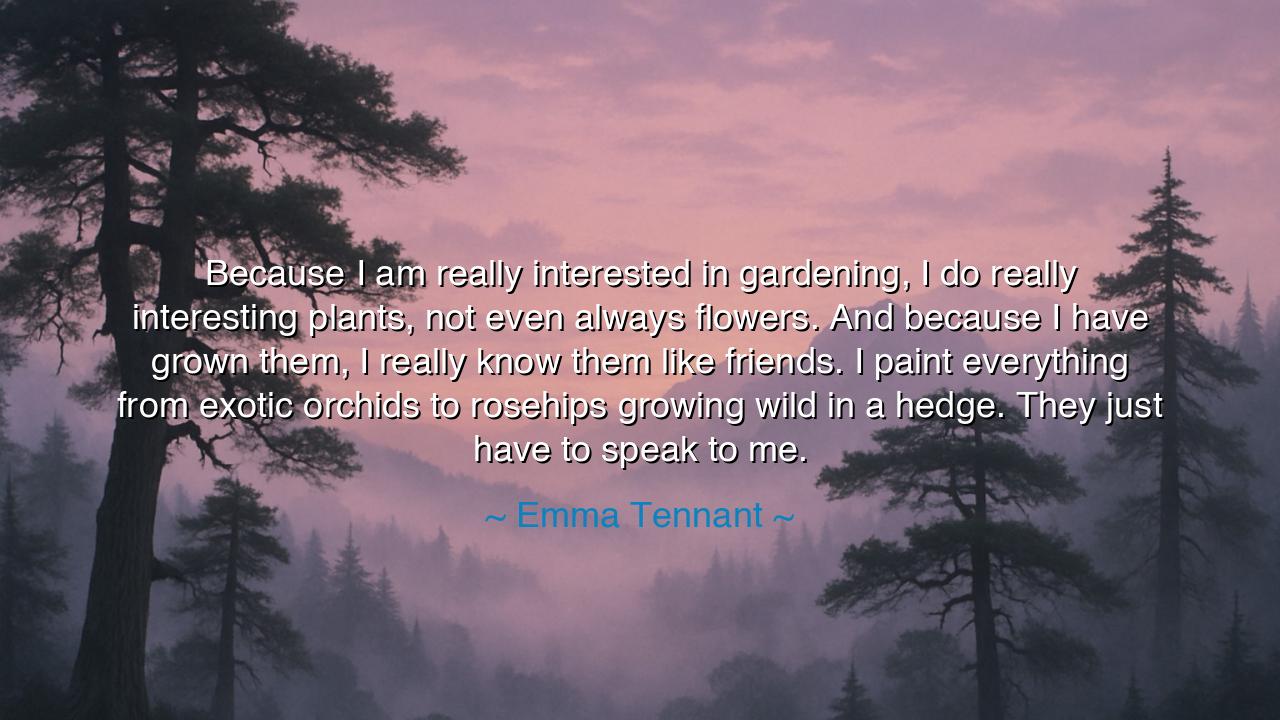
Because I am really interested in gardening, I do really
Because I am really interested in gardening, I do really interesting plants, not even always flowers. And because I have grown them, I really know them like friends. I paint everything from exotic orchids to rosehips growing wild in a hedge. They just have to speak to me.






In the heart of the garden, amidst the hum of nature and the delicate rustling of leaves, there exists a sacred bond between the gardener and the plants they nurture. Emma Tennant, in her profound reflection, speaks to this bond: "Because I am really interested in gardening, I do really interesting plants, not even always flowers. And because I have grown them, I really know them like friends. I paint everything from exotic orchids to rosehips growing wild in a hedge. They just have to speak to me." These words capture a deep and ancient understanding: that the act of gardening is not just the cultivation of plants, but the cultivation of relationship—a relationship rooted in patience, understanding, and a profound connection to the earth.
The ancients knew well that gardening was an act of creation, but also an act of deep listening. In the time of the Greek philosophers, nature was not something to be conquered, but something to be understood. Aristotle often spoke of the interconnection between the elements of nature and the human soul. He believed that to truly know oneself, one must first understand the world around them. In this way, Tennant’s relationship with her plants mirrors the wisdom of the ancients. By growing them, tending to them, and listening to their whispers, she comes to know them not as objects to be admired, but as living beings, full of mystery and soul.
It is through this intimate relationship with nature that gardening becomes something sacred. When Tennant speaks of knowing her plants "like friends," she reflects the timeless belief that all life is interconnected, and that through careful attention and love, the earth’s gifts reveal themselves in full measure. The act of tending a plant is an act of deep respect, much like the way one tends a friendship. It is through the act of care, of nurturing, and of listening, that the bond is formed. This is not a superficial relationship, but one rooted in the soil, in the slow, steady rhythm of growth and change. The plant, like a friend, reveals its nature in time, and the gardener, with patience, learns to understand and honor it.
In the ancient world, gardens were not just places of beauty or utility, but places of reflection and spiritual nourishment. The Egyptians, for example, cultivated gardens that were thought to be a reflection of the divine order, a place where the gods walked and where the soul could find peace. The Romans, too, saw the garden as a space for philosophical thought. In their gardens, they not only grew food and flowers, but they cultivated the peace of mind that allowed for contemplation and insight. To them, a garden was a place where one could commune with the divine, where the acts of planting and tending were intertwined with the search for truth. Emma Tennant’s artful reflection on her garden shows us that in tending to plants, we not only cultivate the soil but the spirit, and in return, the earth speaks to us, revealing wisdom that only the patient and humble can hear.
When Tennant speaks of her love for exotic orchids and rosehips, she reminds us that all plants, whether rare or common, have their own voice. Each plant has its own unique beauty, its own rhythm, and its own lesson to offer. Just as the ancient botanists and herbalists traveled the world seeking out rare plants, so too does Tennant seek out the beauty in the simplest of plants. The orchids, with their exotic elegance, speak of the wonders of nature’s complexity, while the rosehips, wild and untamed in a hedge, speak to the simplicity and strength found in nature’s most unassuming forms. Both, in their own way, reveal the interconnectedness of all things—delicate and wild, precious and common—each carrying within them the same profound lesson: that all life is worthy of respect and celebration.
The act of planting, growing, and painting is an act of celebration—of life itself. By choosing to engage with the earth in this way, Tennant embodies the ancient belief that every plant, like every person, has its own story, its own life force. The act of painting these plants is an extension of this deep connection. When we paint or draw the natural world, we are not merely recreating it; we are honoring it, giving it a space in the world where it can be seen, appreciated, and understood. Tennant’s work, in both her gardening and her art, becomes a dialogue between her and the earth, an ongoing conversation that brings forth the beauty and truth of the natural world.
Thus, let us take the lesson of Emma Tennant to heart. To garden is not just to plant, but to listen, to nurture, and to connect with the earth. Whether we are tending to a rare orchid or a wild rosehip, we must see the plants before us not as objects but as companions. They are not merely inanimate things to be cultivated, but beings that, like us, seek light, water, and care. In this relationship, we come to know not only the plants but also ourselves, for in caring for the earth, we learn the true meaning of patience, love, and respect. Let us, like the ancients, honor the sacred bond between the gardener and the garden, and through it, find the deeper truths that bind us to the earth, to each other, and to the divine.






AAdministratorAdministrator
Welcome, honored guests. Please leave a comment, we will respond soon